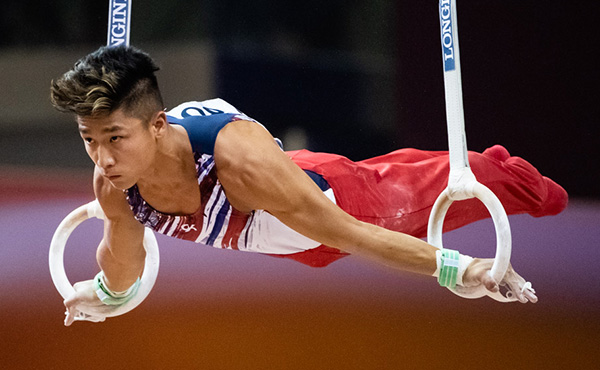
By Blythe Lawrence
All kinds of questions were thrown at Yul Moldauer after Monday’s men’s team final at the World Championships in Doha.
His thoughts and feelings? His aches and pains? His potential Olympic future and the big plans for it? The focus was all on him, but before discussing himself, the soft-spoken Moldauer took time to acknowledge everyone else.
All the people who had helped him get to the World Championships. The University of Oklahoma and his NCAA coach Mark Williams. His club gym, 5280 Gymnastics in Colorado, where he trained as a child, working his way up the junior ranks and onto the national team.
“I wouldn’t be here without them,” he said.
It takes a village to raise a child and an army of coaches, trainers, physios and tutors to produce a World team member. Moldauer gets it, and in his three years at OU and on the floor under the lights of the Aspire Dome in Doha, Qatar, the 22-year-old has been able to count on those around him, both in and out of the gym.
“It’s definitely a stress reliever,” said Moldauer, who balanced extra hours in the gym preparing for the World Championships in addition to working out with his Oklahoma team. Occasionally, he’s had to ask for extra time or accommodation because of his travel and competition schedule.
“My teachers understand. They know I’m representing the USA,” he said.
Moldauer won the U.S. men’s lone medal, a bronze on floor, at the 2017 World Championships in Montreal. This year, he’s been one of the USA’s driving forces in Doha, leading off the team final effort with a sharp, clean routine on pommel horse and loudly supporting his teammates whenever he wasn’t up on the apparatus. In the runup to the World Championships, Moldauer was one of the few to say publicly that he believed in the U.S. men’s potential to accomplish big things.
“You couldn’t ask for a more gracious human being to work with,” said men’s High-performance Director Brett McClure. “The kind of energy he brings into the gym is very, very contagious. He’s exactly the guy you want on your team.”
Moldauer’s talent was evident early on. As a junior, he was often the smallest guy on the floor, but always the one who threw some of the biggest tricks. He’s evolved into a sleek competitor who knows how to keep his head when the pressure’s on.
“He’s a different animal,” said Oklahoma teammate Allan Bower, the U.S. alternate in Doha. “It’s pretty insane. He’ll take one turn warming up and he’ll just nail a routine. And he does that all of the time.”
In Doha, Moldauer says he’s been helped by the jubilant, NCAA-style atmosphere he and his teammates have tried to recreate under the Aspire Dome. The recipe for an NCAA-style Worlds, which includes bellowing cheers and playing up a stuck landing or hit routine with fist pumps, has helped him feel more at home half a world away.
Moldauer qualified to Wednesday’s men’s all-around final in 19th place and also made the men’s floor final, where he’ll try to improve on last year’s bronze medal finish. After mistakes on pommel horse and high bar in the prelim, he cleaned up on horse in the team final, improving his score by more than two points. Moldauer feels he improves over the course of a long competition: “It’s almost like, you start settling in and you get all the nerves out and go out there and just do your thing,” he said.
Moldauer enters the all-around final having worked to put some back pain and a sore bicep out of his head, consciously filling it instead with the recognition that he’s lucky to be where he is. For that, true to form, he gives thanks.
“I’m sure a lot of people would be in pain just to be in this situation,” he said. “I can’t take it for granted.”




